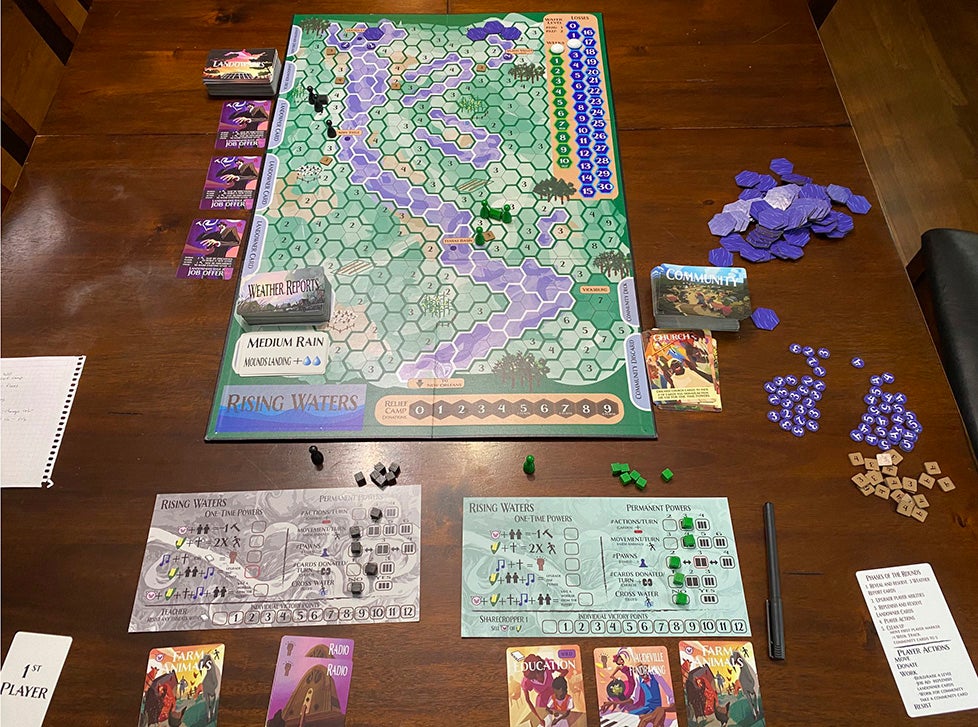Dr. Scout Blum’s historical game links academics with gaming
Published 12:31 pm Wednesday, March 22, 2023

- Rising Waters is a historical board game that was created by Troy University History Professor Dr. Scout Blum. (Submitted photo)
|
Getting your Trinity Audio player ready...
|
By Savanah Weed
Troy University history professor Dr. Scout Blum has merged game playing and academics with her newest creation, a board game called Rising Waters, which aims to give students a better understanding of one of the most destructive disasters in US history and the themes of racism and perseverance.
Rising Waters is a multi-player board game centered around the Great Mississippi Flood of 1927 that killed hundreds and displaced around 700,000 people. The disaster disproportionately affected African Americans who lived in communities among the Delta lowlands, who were mostly excluded from government relief programs and who continued to experience vigilante violence from white landowners who also lived in the area.
Blum first began using gameplay in the classroom after connecting with Reacting to the Past, a group of professors who produce historical roleplaying games for classrooms.
 “The games worked really well with the students at engaging them and getting them to think in different ways rather than just me lecturing them,” she said. “It’s a very engaging way to get people into history. Playing games gets you to think about things very, very differently.”
“The games worked really well with the students at engaging them and getting them to think in different ways rather than just me lecturing them,” she said. “It’s a very engaging way to get people into history. Playing games gets you to think about things very, very differently.”
An environmental historian, Blum said she wanted to create a game that dealt more with her field of expertise, but that still covered the historical aspects of racism, justice and how people dealt with environmental disasters. Her initial idea was to convert the impacts of the flood into another roleplaying game, but she had another idea.
“As I started studying, I thought it would make an interesting board game since I had just started using those in the classroom, and there really were very few board games that dealt with these issues,” she said.
The board of Rising Waters is a map of the area around Vicksburg, Mississippi, with the river splitting the board in half. Players also have the ability to set up towns and characters around the map with the goal of avoiding the rising waters.
The game has a vast card system with cards representing more flooding, the ability to build levees to protect their towns and level-up cards that allow players to move around the board faster and become more skilled. Players are also playing from the perspective of an African American.
“Through these cards, the players have power and control and agency in what’s happening to them because there’s also a very bad side,” she said. “What we also have happening, which is realistic to the historical side, is a tremendous amount of racism. So, we have cards that come up like ‘threats,’ ‘force’ and ‘race hatred’ that basically indicate racist actions have happened.
“(The perspective aspect) is pretty unique. You don’t tend to have that perspective, especially in games, but I felt it was important to put the player in that mindset.”
Blum began developing and play-testing Rising Waters in the fall of 2019. After prototyping, design and development, her creation placed 13th out of around 150 entries in the Zenobia Award contest in 2021. The Zenobia Award is an organization dedicated to recognizing historical board games, but also game makers in underrepresented populations, like women, people of color and members of the LGBTQ+ community.
“The Zenobia Award contest was very important to me,” she said. “It was amazing to get the feedback. The contest was really helpful to me, and it brought Rising Waters to the attention of the publishers, too.”
The game was published by Central Michigan University Press, and Blum credits much of her success to their guidance and assistance.
“I want to thank the group at Central Michigan University Press who are publishing this game,” she said. “This is their first big board game, so they’ve been very patient and kind and supportive, and that has meant a lot. I wouldn’t be in this position without them.
“It’s been very rewarding to see the positive feedback and press that it’s been getting because of just the giant amount of work that’s gone into it.”
Blum has been part of the History and Philosophy department at TROY since 2000 and also teaches a “History through Games” class—that counts as a general study requirement—and a “History of Game Design” class.
“Board games are not just silly, frivolous things. They can also be things that touch on important topics and that help people understand these topics in a different way,” she said. “It’s a very difficult skill to write clearly and concisely, so to have kids think about directions and writing rules for a game… that skill can be applied to many different areas of academics and life in general.
“I’ve found that gaming and education go very well together, and it’s something I’m going to continue to use in the classroom. Making a game is a bizarre thing for an academic historian to do, but this University has been incredibly supportive of that.”
Rising Waters is currently available for pre-order with shipping in May. There is also a digital version of the game available for free on Tabletopia.





